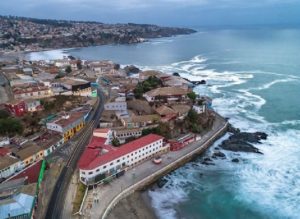Resilience Narratives: International Research Team Plans to Share the Stories of Frontline Communities Leading Initiatives for Ecosystem Restoration & Cultural Survival
Several research partners affiliated with the Global Resilience Research Network have been meeting periodically over the past year to share updates on community-engaged scholarship in unique environments where land, water and urban spaces overlap. The core team members include water governance scholar Oliver Hensengerth from Northumbria University in the UK, psychologist Gonzalo Bacigalupe of UMass Boston and CIGIDEN, the interdisciplinary multi-hazards resilience research institute at the Pontifical Catholic University of Chile, marine scientist Nadia Al-Mudaffar from University of Basrah in Iraq, as well as Northeastern University scientists. Northeastern professors Brian Helmuth, GRI Affiliated Faculty member, and Mark Patterson, GRI Chief Technology Officer, bring expertise in areas including marine and estuarine ecology, environmental monitoring technologies, and climate resilience.

With a vision of communicating stories from communities that are navigating profound environmental and social changes with a broad and diverse audience, this research team is developing a plan to create immersive digital storytelling modules that depict the challenges and resilience solutions emerging in unique places around the world where they live and work. The GRRN team will utilize new media tools to advance public understanding of the deep connections between ecological restoration and cultural resilience. Immersive storytelling is a technique that is finding its way into new spaces such as theatres, games, documentaries, advertising, and journalism. The aim is to give people the feeling of really “being there” through virtual and augmented reality technologies in the process.
We envision creating a series of parallel storytelling modules set in communities where rivers meet the sea—including Iraq’s Hammar Marshes, Cartagena Chile, and India’s Sundarbans region. Members of the research team and community members will film short interviews, which will be combined with annotated maps and aerial photography to tell the stories of communities that are on the front lines of environmental change and sociopolitical instability. The power of community storytelling lies not only in the stories created – but also in the process of their creation. Therefore, this project intends to focus on enhancing community resilience in these areas by engaging locals with different perspectives, passions, and skill sets in the research process.
The team hopes to incorporate tools for storytelling such as Virtual Tours and Storymaps created by researchers in Dr. Helmuth’s Lab. They will also draw on Dr. Bacigalupe’s previous work looking at the role of digital volunteers and the use of drones to strengthen disaster risk reduction of communities in Chile, and Dr. Hensengerth’s participatory research program in river delta communities across Asia. This project offers an innovative, holistic approach to enhance public understanding of how ecology and culture intertwine, and to share stories of community resilience.
